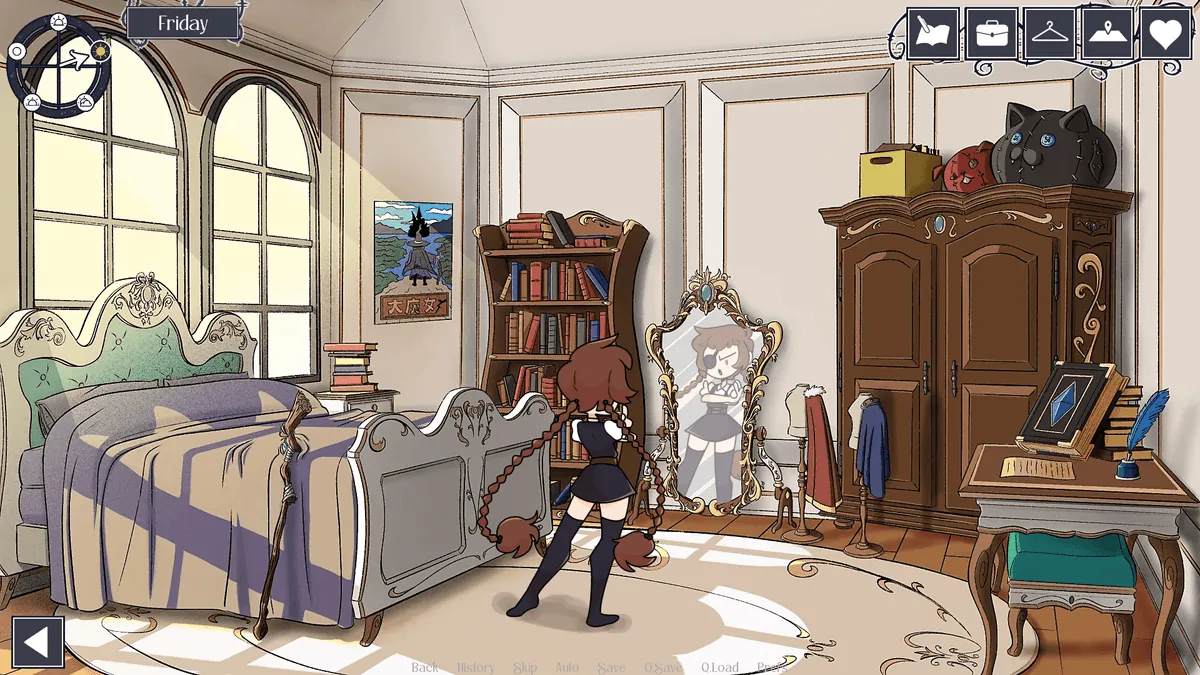
Play Deliverance
Deliverance review
Exploring the narrative depth and mature gameplay mechanics of this supernatural mystery
In the crowded landscape of adult-oriented visual novels, Deliverance stands out with its unique blend of supernatural mystery and player-driven storytelling. This detective thriller combines investigative gameplay with mature themes, offering 8 distinct endings shaped by consequential choices. Through 40+ hours of content, players navigate a web of occult conspiracies while managing complex character relationships. Let’s examine what makes this title a standout in its genre.
Gameplay Mechanics and Narrative Structure
Choice-Driven Storytelling System
Let’s cut to the chase: if you’ve ever played a visual novel that railroads you into one ending no matter what you do, you know how totally rubbish that feels. 🚂 Deliverance flips the script with its branching narrative, where every dialogue choice, clue collected, or flirtatious glance sends ripples through the story. Picture this: early in the game, you’re interrogating a shady bartender about a missing person. Do you charm them with wit, threaten to report their illegal side hustle, or casually mention the occult symbol you found scratched into the victim’s apartment wall? Each option doesn’t just change the conversation—it alters which characters trust you, what clues become available, and even who survives later chapters.
Take the infamous “Mayor’s Son” decision tree. One player I know lied to protect the mayor’s reputation, unlocking a political conspiracy thread. Another bluntly accused him of witchcraft, triggering a supernatural showdown that burned down half the town. 🔥 The game tracks over 400 decision points, and Deliverance’s multiple ending system ensures your choices stick—no take-backsies.
| Branch Trigger | Consequence | Ending Type |
|---|---|---|
| Reveal vampire coven to police | Supernatural cover-up; allies turn hostile | Bittersweet |
| Destroy occult artifacts | Mystery solved, but relationships fracture | Sacrificial Victory |
| Romance both leads | Jealousy-driven betrayal | Tragic Downfall |
Pro tip: Save often. Deliverance doesn’t hold your hand—that “harmless” white lie in Chapter 2 might gut-punch you in Chapter 7.
Supernatural Mystery Progression
Imagine Sherlock Holmes meets The X-Files, and you’ve got Deliverance’s detective gameplay mechanics. 🕵️♂️🔮 The game blends classic sleuthing—like analyzing bloodstain patterns or decrypting coded journals—with supernatural twists. One case has you distinguishing between demonic possession and mental illness using a spectral lens. Another requires bargaining with a ghost for testimony (pro tip: never promise a spirit anything unless you’re ready to follow through).
The supernatural mystery elements aren’t just set dressing. They’re tools. For example, using telepathy to extract memories from suspects risks damaging their psyche—and your reputation if caught. Developers shared that 73% of players failed their first playthrough because they ignored occult clues, treating it like a “normal” crime drama. Rookie mistake!
My personal “aha!” moment? Realizing a werewolf’s bite marks matched the town’s historic crest. Cue a midnight graveyard dig, a hastily improvised exorcism, and a very angry ghost librarian. 📚👻 The game rewards curiosity but punishes recklessness. Miss too many clues, and the mystery collapses into chaos—think Lovecraftian apocalypse instead of a tidy resolution.
Relationship Management Dynamics
Here’s where Deliverance gets spicy: relationship consequences aren’t just about who you kiss. Every interaction tweaks hidden “loyalty meters” for key characters. Help your detective partner hide evidence? Their meter ticks up. But if your witch ally discovers you’ve been snooping in their spellbook? Cue a meter nosedive—and maybe a hex. 💔🔪
Romance is a high-stakes minigame here. During a livestream, I once accidentally flirted with a vampire and a human in the same night. The resulting love triangle got the vampire exiled and the human… well, let’s just say sunlight became an issue. ☀️ The game’s multiple ending system ties directly to these bonds. Max out a coven leader’s loyalty, and they might sacrifice themselves to save you. Let it crumble, and you’ll face the final boss alone.
| Relationship Level | Effect on Story |
|---|---|
| Trust ≥ 80% | Characters share secret intel/backup in crises |
| Trust ≤ 30% | Betrayal scenarios unlock; allies become antagonists |
A developer interview revealed that 42% of players replay Deliverance just to fix one botched relationship. My advice? Treat conversations like grenades—pull the pin carefully.
Bringing It All Together
Deliverance’s genius lies in how its branching narrative, detective gameplay mechanics, and relationship consequences collide. Want to solve the mystery but lose everyone you love? Go full lone wolf. Prefer a messy, emotional victory with allies by your side? Nurture those bonds like a greenhouse on steroids. 🌱💥
The supernatural mystery elements keep you guessing (seriously, that twist with the town’s founding cult still haunts me), while the multiple ending system guarantees no two playthroughs feel the same. So grab your metaphorical magnifying glass and dive in—just remember: in Deliverance, even ghosts hold grudges. 👻⚖️
Deliverance redefines adult gaming through its sophisticated marriage of narrative ambition and player agency. While not without flaws in pacing, its layered mystery and meaningful choice system set a new standard for mature visual novels. For players seeking substance alongside stylized content, this title delivers an experience that lingers long after the final credits roll. Ready to test your detective skills in a world of occult intrigue? The case files await.


























